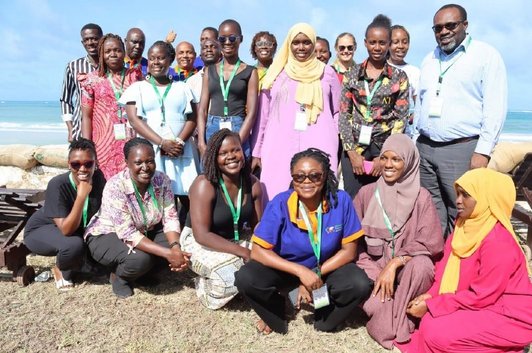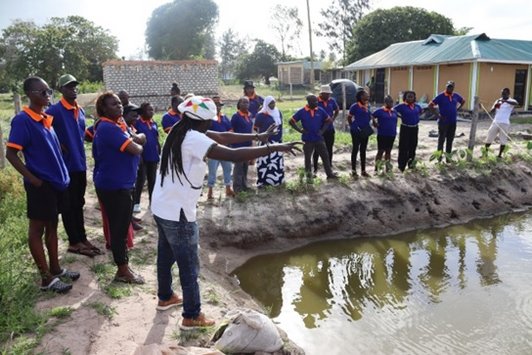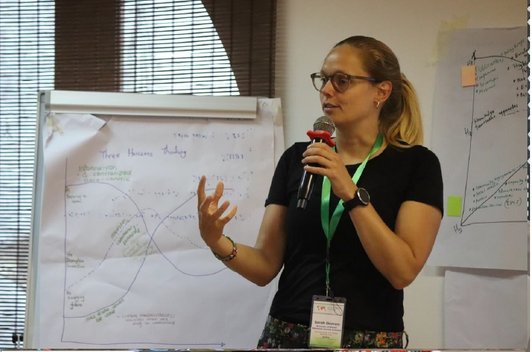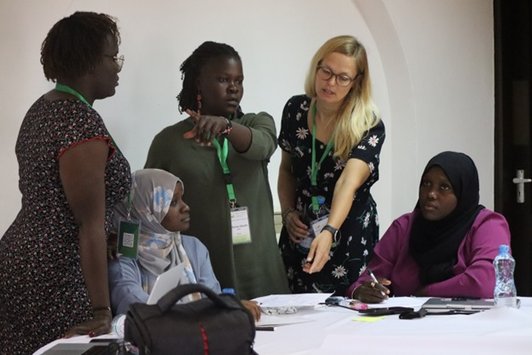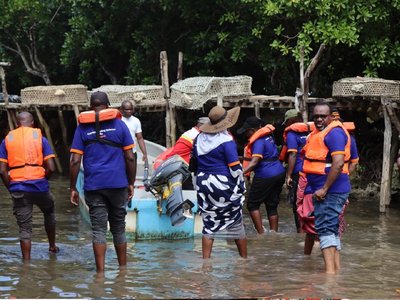

The Seasonal School 2024 was organised and hosted by ACTS Pathways Academy, a virtual learning lab operating under the Climate Resilient Economies (CRE) Program at the African Centre for Technology Studies with financial assistance by the Austrian-African Research Network (Africa-UniNet) and in collaboration with BOKU University (Austria), Kyambogo University (Uganda), University for Development Studies (Ghana), University of Innsbruck (Austria), and Maseno University (Kenya). The summer school outlined a comprehensive program that promotes sustainable development through Science Communication and Transformational Leadership in order to bridge the gap between scientific knowledge and community engagement.
The summer school featured various activities to enhance participants’ understanding and application of decolonial perspectives and sustainable practices. Public lectures addressed themes such as sustainable science communication, transformational leadership, and gender and diversity integration, promoting a more inclusive approach to science communication. Talks focused on effective strategies for engaging diverse communities in scientific research. Group discussions explored integrating Indigenous knowledge with Western science and social innovation, resulting in actionable plans and hypothetical projects. Theoretical frameworks on sustainability and transformational leadership were provided through lectures, equipping participants with practical knowledge. Case studies showcased real-life applications, while walk shops included guided tours of coastal ecosystems, offering firsthand experience of Indigenous conservation practices. Informal events, such as the Cultural Evening, fostered cultural appreciation and networking among participants. These activities aimed to promote a more inclusive, equitable, and sustainable approach to knowledge and practice.
The summer school employed a comprehensive methodology to ensure effective learning and engagement. Interactive tools and exercises, including the Rivers of Life exercise, All Hands on Deck cards, and the Communications Wheel, actively engaged participants in their learning. Collaborative learning was emphasized through group discussions, case studies, and walk shops, encouraging teamwork and knowledge exchange. Expert facilitators guided the learning journey, providing expertise and fostering an inclusive environment. This multifaceted approach deepened participants' understanding of decolonial perspectives and sustainable practices.
Results
Day 1: Community-Centred Science Communication
The first day centered on empowering local voices through community-centred science communication. Dr. Grace Ssanyu Asiyo led a session focused on bridging the research-practice gap, fostering ownership through community engagement, and tailoring solutions to meet the unique needs of each community. This session introduced innovative methods such as Knowledge Cafés and Knowledge Champions to promote interactive learning. Participants were encouraged to view communities as equal partners in research, making science more inclusive and impactful.
Day 2: Decolonial Perspectives in Science Communication
The second day explored decolonial perspectives in science communication, emphasizing the importance of simplifying technical jargon and establishing feedback mechanisms. Participants discussed the challenges of translating scientific language into accessible terms and the role of multimedia in enhancing engagement. The session highlighted the need for collaboration between researchers and communities to bridge the gap between scientific knowledge and its practical application.
Day 3: Field Excursion
Participants visited several aquatic farming sites, starting with Kijiweni Landing Site, where they learned about cage aquaculture and its potential for sustainable fish production, particularly for women who struggle to access open sea resources. They also explored Kibuyuni Seaweed Farm, witnessing successful seaweed cultivation and its economic benefits, and the SolColDry Go Blue Project, designed to reduce post-harvest losses of fish and agricultural products. Later, participants attended a lecture on Integrated Multi-Trophic Aquaculture (IMTA), emphasizing its sustainable practices and potential for product diversification.
Day 4: Interactions with Key SDGs
This session highlighted critical insights from a field excursion on the interconnectedness of the Sustainable Development Goals (SDGs). Participants shared their experiences from the excursion, emphasizing the importance of learning, networking, and grasping how to implement SDG initiatives professionally. The discussions highlighted the SDGs' interconnected nature, particularly emphasizing gender equality, economic growth, and sustainable practices.
Participants also learned about a transformative journey in Kibuyuni, where collaboration with researchers on seaweed farming addressed environmental challenges, empowered women, and created new economic opportunities through the Blue Empowerment Project.
Day 5: Decolonizing Knowledge in International Scientific Cooperation
This session addressed the influence of colonial legacies on knowledge production and dissemination. Participants discussed the need for flexible, inclusive research frameworks that integrate indigenous knowledge systems. The session encouraged the development of a decolonial toolbox for research collaboration, aiming to empower diverse knowledge creators and promote inclusive science communication.
Day 6: Presentation of Group Projects
On the final day, participants presented their group projects addressing societal issues through decoloniality, science communication, and transformational leadership. Projects included a game to boost women's confidence, a multimedia campaign for vaccine awareness, and a web interface for HIV/AIDS awareness. The presentations emphasized the significance of effective science communication and inclusivity, with participants voting for the best project via the Mentimeter platform.
Downloads
-
Download ProceedingsPDF·13 MB
